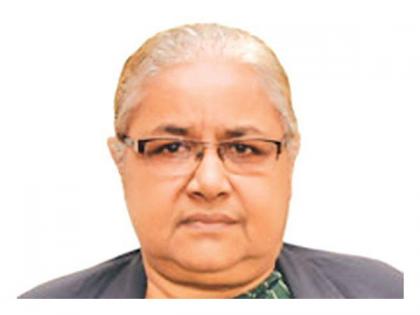Amid political turmoil, former Nepal Chief Justice Sushila Karki emerges as likely candidate to lead transition government
By ANI | Updated: September 10, 2025 18:45 IST2025-09-10T18:44:13+5:302025-09-10T18:45:04+5:30
Kathmandu [Nepal], September 10 : Amid unrest in Nepal and resignation of KP Sharma Oli as Prime Minister, former ...

Amid political turmoil, former Nepal Chief Justice Sushila Karki emerges as likely candidate to lead transition government
Kathmandu [Nepal], September 10 : Amid unrest in Nepal and resignation of KP Sharma Oli as Prime Minister, former Chief Justice Sushila Karki's name has emerged as one of the possible candidates to lead the new transition government, sources said on Wednesday.
The development comes as Nepal navigates a period of uncertainty, with political parties and stakeholders seeking consensus to ensure a smooth transition and maintain stability in the country.
Nepal has witnessed Gen Z protest, a widespread movement led by young people, primarily students, to demand accountability and transparency from the government. The protests began on September 8, 2025, in Kathmandu and other major cities, including Pokhara, Butwal, and Birgunj, after the government imposed a ban on major social media platforms, citing tax revenue and cybersecurity concerns.
As tensions mounted, the situation quickly escalated on the ground. At least 19 people were killed and 500 injured in clashes with security forces. Curfew was imposed in several cities, including Kathmandu, to control the situation.
Gen Z delegation is said to have agreed on Sushila Karki's name to lead the transition government, as per local media reports.
Sushila Karki made history as she became Nepal's first female Chief Justice, serving in the role from July 2016 to June 2017.
Born on June 7, 1952, in Biratnagar, Sushila Karki is the eldest of seven children. She began her legal career in 1979 after completing her law education in Biratnagar. She became a Senior Advocate in 2007.
Karki was appointed as an ad-hoc judge of the Supreme Court in January 2009 and became a permanent judge in 2010.
The Nepali Army on Wednesday announced the imposition of prohibitory orders and continuation of the nationwide curfew in response to the escalating unrest driven by the Gen Z-led protest in various parts of the country.
In a statement released on Wednesday by the Directorate of Public Relations and Information, the Army stated that the prohibitory orders will remain in effect until 5:00 pm today.
Following that, a nationwide curfew will come into force from 6:00 am on Thursday, Bhadra 26 (September 11).
The Army noted that any further decisions will be made based on the developing security situation.
The Army also expressed appreciation for people's cooperation in helping maintain order, while offering condolences for the loss of life and property during the ongoing protests.
It also warned that "lawless individuals and groups" had infiltrated the movement and were engaging in dangerous criminal activities, including arson, looting, violent assaults, and even attempted rape.
"The Nepal Army expresses its gratitude to all citizens for their continued support in fulfilling their responsibility to maintain peace and security in the country in the current difficult situation. Expressing deep sorrow over the loss of life and property during the protests, everyone is requested to cooperate in efforts to control criminal activities," the release said.
Twenty-seven individuals involved in looting, arson, and other violent acts during the ongoing Gen Z-led protests across Nepal, including in the capital, Kathmandu, have been arrested by the Nepalese Army, The Himalayan Times reported on Wednesday.
According to The Himalayan Times, the arrests were made between 10 pm on Tuesday and 10 am on Wednesday, as a nationwide deployment of forces was made to manage the ongoing protests. Security personnel also deployed three fire trucks to extinguish fires set during the unrest.
In Kathmandu's Gausala-Chabahil-Bouddha corridor, authorities recovered NRs 3.37 million in stolen cash from suspects.
In addition, security forces seized a large number of weapons, including 31 firearms of different kinds, along with magazines and ammunition, confiscating 23 from Kathmandu and eight from Pokhara, as reported by The Himalayan Times.
The Army also confirmed that 23 Nepal Police officers and three civilians injured in recent clashes are being treated at military hospitals.
Following his departure, Oli had said he would personally lead all-party talks to bring a "meaningful conclusion" to the unrest. His resignation shows the deep political instability in the Himalayan nation.
Protesters have been demanding an end to "institutionalized corruption and favouritism" in governance. They want the government to be more accountable and transparent in its decision-making processes.
Public frustration deepened further when the "Nepo Babies" trend on social media exposed the lavish lifestyles of politicians' children, highlighting the economic disparity between them and ordinary citizens. This fueled public frustration over corruption, nepotism, and economic inequality.
Amid these grievances, Nepal's ongoing jobs crisis, with nearly 5,000 young people leaving the country every day for work abroad, added to the unrest.
Disclaimer: This post has been auto-published from an agency feed without any modifications to the text and has not been reviewed by an editor
Open in app